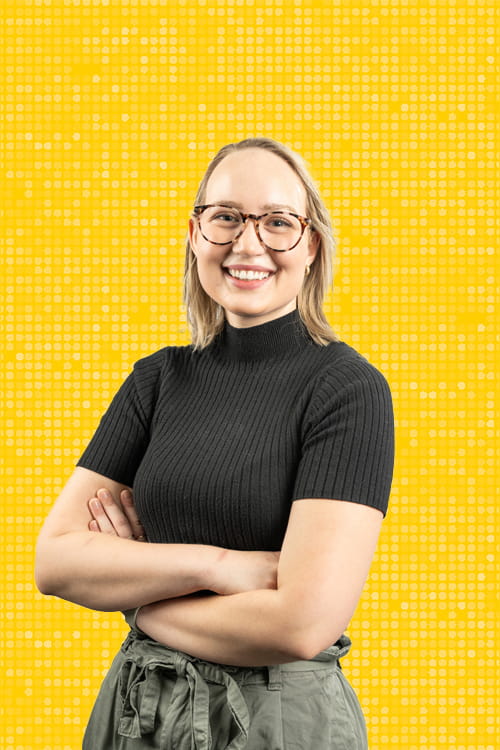
Samantha Wuebker, PhD student, biomedical science
Extracts how teeth harden
“No doubt, Sam’s intellectual drive coupled with her ability to overcome challenges exemplifies the excellent research being conducted at the University of Iowa. As a fellow graduate student, I cannot think of anyone better than to nominate for this honor.” – Tim Nguyen, PhD student, genetics
Hometown: Milford, Iowa
Faculty mentor/advisor: Eric Van Otterloo, PhD, assistant professor, Periodontics, Iowa Institute for Oral Health Research, and Anatomy and Cell Biology
What is your degree program and anticipated graduation date? I’m a PhD candidate in cell and developmental biology subprogram in the Biomedical Science Program and expect to graduate in 2025.
Please describe your research: My research focuses on understanding how a specific protein, MEMO1, aids in mineralization of the bones and teeth. I’m specifically interested in how our cells communicate with the environment to deposit minerals and other essential molecules to form bone and tooth enamel. In addition, I study defects in cell communication leads to human disease with the hopes of finding therapeutic targets to aid in bone and tooth repair.
In simple terms, why does this research matter? Craniofacial birth defects are the second most common type of birth defect around the globe; however, we have very limited preventative, diagnostic, and therapeutic options. Many of these birth defects impact bone growth and development and leave patients needing multiple corrective surgeries throughout their life. My work aims to find molecules and cell pathways that could be used to treat skeletal and tooth disorders in adults and children and, hopefully, increase quality of life.
How soon after starting at the University of Iowa were you able to participate in research? I started as soon as I joined my graduate program!
How has being involved in research made you more successful at the University of Iowa? Research has allowed me to grow personally and professionally. The biggest thing I have learned being in research is perseverance. Science is unpredictable. Things often don’t work out, or your hypothesis is wrong, and I’ve learned to continue despite the setbacks. This often means modifying the way I look at this and refining experiments. All of the failure and work is worth it because when something works and your prediction is correct, there is a thrill of being the first person in the world to know the outcome. Additionally, I have learned that I have a passion for science education and outreach—especially bringing science to rural communities.
What are your career goals and/or plans after graduation? I ultimately hope to find a job within academia where I can continue my research as well as take on a teaching faculty position working with undergraduate and graduate students.
Banner location: Downtown—
